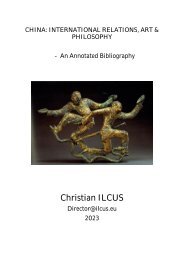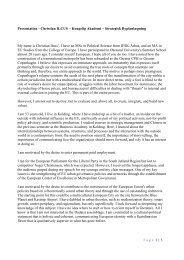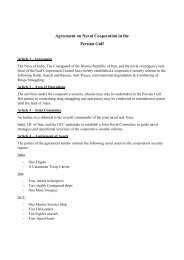diplomacy in antiquity
This is a review piece of books on diplomacy in antiquity begiining with mesopotamia, amarna, the phoenicians, the greeks and romans. The amarna book I found at an exposition at Glyptoteket, CPH.
This is a review piece of books on diplomacy in antiquity begiining with mesopotamia, amarna, the phoenicians, the greeks and romans. The amarna book I found at an exposition at Glyptoteket, CPH.
Create successful ePaper yourself
Turn your PDF publications into a flip-book with our unique Google optimized e-Paper software.
so much due to the priority given to opportunity and the loss of power but the failure to address
internal and external challenges within a coherent policy framework. The perception of the
complexity this entailed led to a diminished margin of return given to the decision-makers, which is
why the endeavor of unity continuously failed.
Egypt, the first and most important of the Middle East’s classical empires next to Persia, is the
store-keeper of the Amarna letters, discovered in 1887 during an excavation. The letters testified to
the development of a fully-fledged diplomatic system in the Late Bronze Age from 1500-1100 B.C.
The great power of this age: were Egypt, Babylonia, Assyria, Mittani, and the Hittites. Amarna
entered this club due to successful military campaigns on the Syro-Palestinean plains, Tri-politania
suppression, and Sudan's occupation. Egypt was the sole source of gold, ivory, ebony, and alabaster
which it traded in return for supplies of silver, lapis lazuli, and copper, and, as we have seen, horses,
which Babylonia could deliver thanks to its relationship with the Elamites of Iran. The diplomatic
language was Akkadian, and if the Egyptian sanctuary differed from the religions of the near
eastern plain, the shared polytheism helped underpin the identification of several gods under
different names, homologous with the nature of the international system, Amarna fostered. The
Pharaohs were mostly the object of divination. Egypt nurtured close diplomatic relations with
Mittani, a former foe. It had to off-set the Hittites, a serious contender for influence in the Near East
with that of Assyria ruled out of Ashur, a power in steady ascendance with the relationship of that
of Babylonia, a trusted ally of old. Egypt maintained training links with the Cypriote rulers. It stood
in close contact with the Arzawa in Western Turkey to safeguard against Hittite inroads into the
Egyp-tian sphere of influence, a policy deemed the more urgent following a devastating long war of
fifty years essentially over rulership of vassals and control over strategic nodal points on the Syrian
plain. This provoked the signing of the Peace Treaty after the final battle at Qadesh. “Relations with
3








